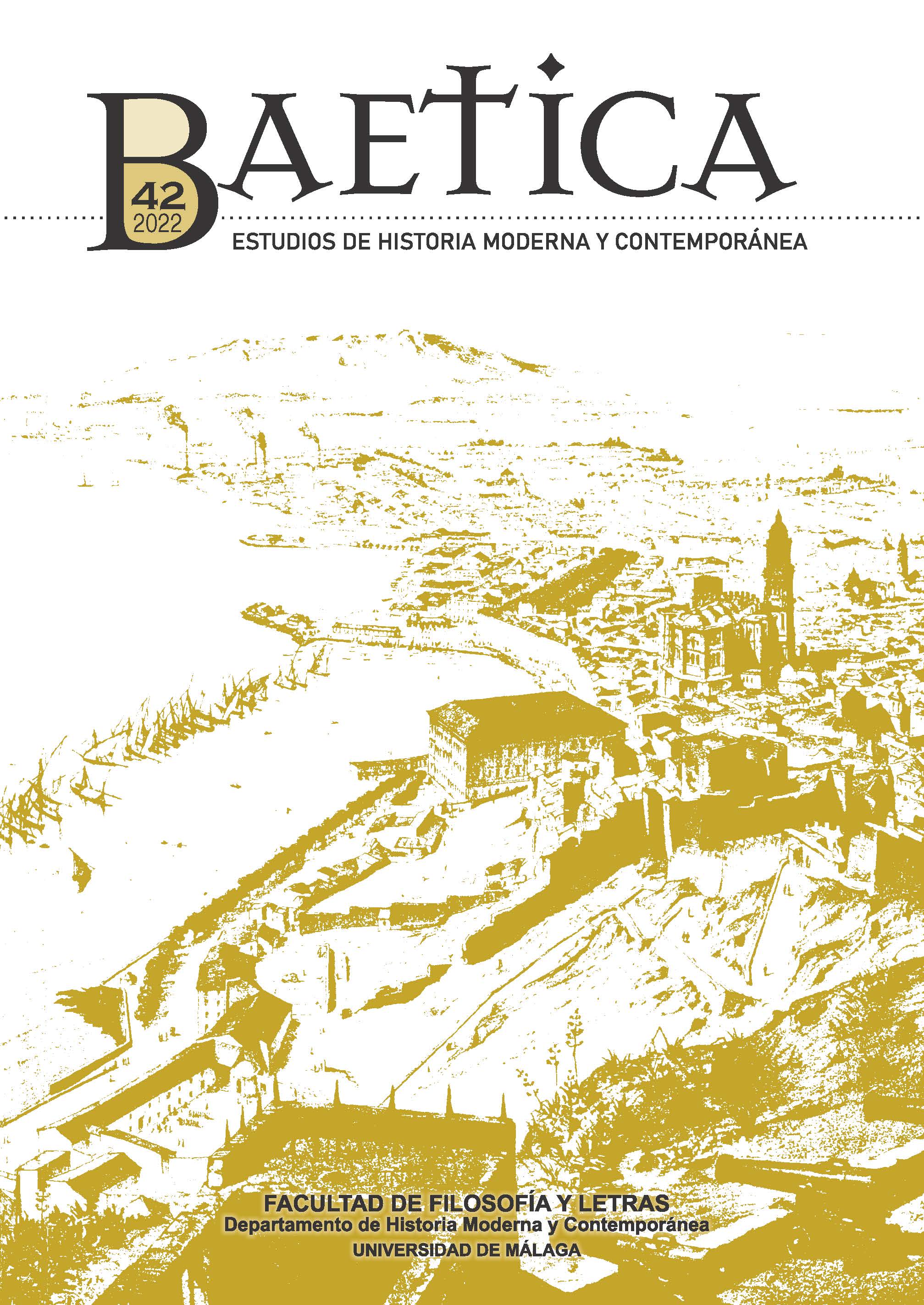Alumbradismo, a New Historiographical Approach
DOI:
https://doi.org/10.24310/BAETICA.2022.vi42.15394Keywords:
alumbradismo, iluminismo, religion, heresy, InquisitionAbstract
The objective of this work is to make an approach to alumbradismo from multiple perspectives in order to understand how it evolved from its first manifestations, a group from Castile, until its drift in the 17th century. In addition, we will question what their relationships have been with other reformist currents, such as Lutheranism or Erasmism, and what are the current historiographical controversies in each of their main peninsular manifestations. From this perspective, we intend to understand one of the heresies that has generated the most doubts due to its inherent ambiguity.
Downloads
Metrics
References
ANDRÉS MARTÍN, Melquíades (1975), Los recogidos: nueva visión de la mística española (1500-1700), Fundación Universitaria Española, Madrid.
ANDRÉS MARTÍN, Melquíades (1994), Historia de la mística en la Edad de Oro en España y América, Biblioteca de Autores Cristianos, Madrid.
ASENSI, Manuel (2006), «Entrevista a Gayatri Chakravorty Spivak», en Asociación de Amigos del Arte y la Cultura de Valladolid. URL: <https://ddooss.org/textos/entrevistas/entrevista-a-gayatri-chakravorty-spivak> (consulta: 24/05/2022).
ASÍN PALACIOS, Miguel (1990), Sadilíes y alumbrados, Hiperión, Madrid.
BATAILLON, Marcel (1966), Erasmo y España, Fondo de Cultura Económica, México.
CASTRO SÁNCHEZ, Álvaro (2019), «Un espacio interior proscrito: formas de lectura y emisión espiritual en María de Cazalla», Alfa. Revista de la Asociación Andaluza de Filosofía, 35, pp. 568-584.
CAZALLA, Juan (1999), La lumbre del alma, Biblioteca Virtual Miguel de Cervantes, Alicante. URL: <https://www.cervantesvirtual.com/nd/ark:/59851/bmc3n239> (consulta: 27/05/2022)
DÍAZ PINEDA, Manuel (2016), Historia, filosofía y praxis del movimiento evangélico en España (siglo XVI), Universidad Complutense, Madrid. Tesis doctoral inédita.
GARCÍA GUTIÉRREZ, José María (1999), La herejía de los alumbrados: historia y filosofía de Castilla a Extremadura, Mileto Ensayo, Madrid.
GIORDANO, María Laura (2004), Apologetas de la fe. Élites conversas entre Inquisición y patronazgo en España (siglos XVI y XVII), Fundación Universitaria Española, Madrid.
GONSALVIO, Reginaldo (1567), Sanctae Inquisitionis Hispanicae artes…, Imprenta de Michael Schirat, Heidelberg. URL: <https://bvpb.mcu.es/es/consulta/registro.do?id=418690> (consulta: 19/06/2022)
HOBSBAWM, Eric (1983), Rebeldes primitivos, Ariel, Barcelona.
HUERGA TERUELO, Álvaro (1978a), Historia de los alumbrados: (1570-1630). I, Los alumbrados de Extremadura (1570-1582), Fundación Universitaria Española, Madrid.
HUERGA TERUELO, Álvaro (1978b), Historia de los alumbrados: (1570-1630). II, Los alumbrados de la alta Andalucía: 1575-1590, Fundación Universitaria Española, Madrid.
HUERGA TERUELO, Álvaro (1988), Historia de los alumbrados: (1570-1630). IV, Los alumbrados de Sevilla (1605-1630), Fundación Universitaria Española, Madrid.
HUERGA TERUELO, Álvaro (1990), «Del alumbradismo al molinismo», Angelicum, 67, pp. 483-508.
HUERGA TERUELO, Álvaro (1994), Historia de los alumbrados: (1570-1630). V, Temas y personajes, Fundación Universitaria Española, Madrid.
LLORCA, Bernardino (1980), La Inquisición española y los alumbrados (1509-1667), Universidad Pontificia, Salamanca.
MÁRQUEZ, Antonio (1972), Los alumbrados: orígenes y filosofía, Taurus, Madrid.
MARTÍNEZ MILLÁN, José (2015), «El movimiento descalzo en los siglos XVI y XVII», Libros de la Corte, 3, pp. 101-120.
MENÉNDEZ PELAYO, Marcelino (2003), Historia de los heterodoxos españoles, Biblioteca Virtual Miguel de Cervantes, Alicante. URL: <https://www.cervantesvirtual.com/nd/ark:/59851/bmch9937> (consulta: 26/04/2022).
NIETO, José Constantino (1997), El Renacimiento y la otra España: visión cultural socioespiritual, Librairie Droz, Ginebra.
PASTORE, Stefania (2010), Una herejía española: conversos, alumbrados e Inquisición (1449-1559), Marcial Pons, Madrid.
PEREA CARPIO, María Ángeles (2015), «Las alumbradas de Baeza: ¿mujeres libres?», en E. MEDINA ARJONA y P. GÓMEZ MORENO (eds.), Escritura y vida cotidiana de las mujeres de los siglos XVI y XVII, Alfar, Sevilla, pp. 119-141.
PÉREZ GARCÍA, Rafael Mauricio (2008), «La censura y la espiritualidad española del Renacimiento. Razones doctrinales y elementos históricos para el conflicto», Cultura Escrita & Sociedad, 7, pp. 13-36.
PÉREZ GARCÍA, Rafael Mauricio (2021), «Tradición espiritual y autoridad en el Libro llamado abecedario espiritual de Francisco de Osuna», Hispania Sacra, 73, pp. 389-402.
PONS FUSTER, Francisco (1991), Místicos, beatas y alumbrados, Institució Valenciana D’Estudis i Investigació, Valencia.
SELKE DE SÁNCHEZ, Ángela (1960), «Vida y muerte de Juan López de Celain, alumbrado vizcaíno», Bulletin Hispanique, 62, pp. 136-162.
SELKE DE SÁNCHEZ, Ángela (1980), «El iluminismo de los conversos y la Inquisición. Cristianismo interior de los alumbrados: resentimiento y sublimación», en Joaquín PÉREZ VILLANUEVA, La Inquisición española: nueva visión, nuevos horizontes, Siglo XXI, Madrid, pp. 617-636.
VALDÉS, Juan de (1999), Diálogo de la doctrina cristiana, Biblioteca Virtual Miguel de Cervantes, Alicante. URL: <https://www.cervantesvirtual.com/nd/ark:/59851/bmcs17w3> (consulta: 30/06/2022).
Downloads
Published
How to Cite
Issue
Section
License
This journal provides immediate free access to its content on the principle of making research freely available to the public. All content published in Baetica. Modern and Contemporary History Studies are subject to the Creative Commons Acknowledgment-NoCommercial-ShareAlike 4.0 license, the full text of which can be found at <http://creativecommons.org/licenses/by-nc-sa/4.0>
They may be copied, used, disseminated, transmitted and publicly displayed, provided that:
The authorship and the original source of its publication (magazine, publisher and URL of the work) must be cited.
They are not used for commercial purposes.
The existence and specifications of this use license are mentioned.
Copyrights are of two kinds: moral and patrimonial. Moral rights are perpetual, inalienable, non-transferable, inalienable, unattachable and imprescriptible prerogatives. In accordance with copyright legislation, BAETICA. Estudios de Historia Moderna y Contemporánea recognizes and respects the moral right of the authors, as well as the ownership of the patrimonial right, which will be transferred to the University of Malaga for its open access dissemination. Economic rights refer to the benefits obtained from the use or disclosure of works. BAETICS. Estudios de Historia Moderna y Contemporánea is published in open access and is exclusively authorized to carry out or authorize by any means the use, distribution, disclosure, reproduction, adaptation, translation or transformation of the work.
It is the responsibility of the authors to obtain the necessary permissions of the images that are subject to copyright.
Authors whose contributions are accepted for publication in this journal will retain the non-exclusive right to use their contributions for academic, research, and educational purposes, including self-archiving or deposit in open access repositories of any kind.
The electronic edition of this magazine is edited by the Editorial of the University of Malaga (UmaEditorial), being necessary to cite the source in any partial or total reproduction.







2.png)
